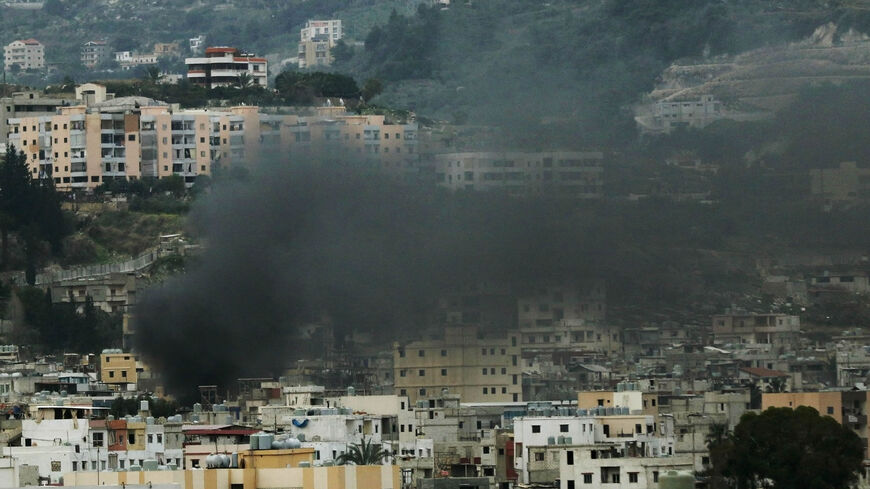BEIRUT — Violent clashes that erupted over the weekend between rival Palestinian factions at a refugee camp in southern Lebanon are continuing on Monday, the official National News Agency (NNA) reported, with at least six people reported killed so far.
What happened?
The violence began on Saturday after a Fatah member shot at Islamist militant Mahmoud Khalil in Ain al-Hilweh camp in the southern city of Sidon, to avenge the death of his brother in March by Islamists, according to the local Al-Akhbar newspaper. Khalil survived the attack with injuries, but one of his companions was killed and three others injured. Khalil is a member of al-Shabab al-Muslim faction, according to Palestinian sources from inside the camp, and is wanted by Lebanese authorities.
In response to Khalil’s assassination attempt, armed militants attacked and fired at Fatah’s headquarters inside the camp. The next day, Fatah commander Abu Ashraf al-Armoushi, who heads the Palestinian National Security Forces in the camp, and four of his aides were killed in an ambush.
بخصوص السلاح غير الشرعي والتفلت الامني والقنابل الموقوتة ب #المخيمات_الفلسطينية ب #صبدا وقبلها السورية بمناطقنا، و #الاشتباكات_العنيفة يلي بيفتعلوها حسب مصالحهم صار بدا حل بكل معنى الكلمة! وعلى #الجيش_اللبناني يفرض سيطرته لان كل هالمشاكل هي امتداد لسلاح ح ز ب الله!… pic.twitter.com/iTSCYU2wBN
— Karen Boustany كارن البستاني (@BoustanyKaren) July 30, 2023
The fighting quickly escalated as militants exchanged fire inside the camp’s narrow alleyways using heavy weapons, including assault rifles, rocket-propelled grenade launchers and lobbed hand grenades.
Stray bullets hit buildings surrounding the camp in the city of Sidon, with residents fleeing their homes. The public Sidon General Hospital also evacuated its staff and patients for safety reasons. The NNA reported on Monday that a rocket-propelled grenade fell in the south of the city (outside the camp), causing material damage. Shops and schools in Sidon closed on Sunday after a Lebanese citizen was injured by a stray bullet, according to the NNA.
The Lebanese army said on Sunday a shrapnel from a mortar shell fell on a military post erected around the camp, wounding one soldier. In a statement, the military warned that it will respond to any attack against its positions and members. The army, which is prohibited from entering the Palestinian camps under a 1969 accord, deployed its forces around the camp and sources said its reconnaissance planes were hovering over the area as the fighting intensified.
The UN Relief and Works Agency (UNRWA) — which provides basic services to an estimated 5.7 million registered Palestinian refugees and their descendants in the Palestinian territories and in neighboring countries, said in a Sunday tweet that two of its schools inside the camp were damaged in the fighting. As a result, the UN agency suspended its operations in the camp.
In another tweet, UNRWA Director in Lebanon Dorothy Klaus called on “all militant parties to ensure civilians’ safety & respect inviolability of UN premises.”
On Sunday night, the rival factions announced in a joint statement a cease-fire reached during a meeting mediated by the Lebanese Shiite Amal and Hezbollah, which hold much sway in southern Lebanon. But by Monday morning, fighting had returned to the streets of Ain al-Hilweh. And Palestinian civilians from the camp were still fleeing the violence toward the city.
Know more
The notorious Ain al-Hilweh camp is the scene of regular violence between Fatah members and Islamist militants vying for influence and power. Tensions have further escalated after an influx of refugees from neighboring Syria. Several new factions opposing the Syrian regime and Hezbollah have emerged inside the camp, causing friction with the other Palestinian groups.
عين الحلوة .. المأساة مستمرة pic.twitter.com/Xya2fv7UhQ
— مصدر مسؤول (@fouadkhreiss) July 31, 2023
The camp, the largest in Lebanon, is home to around 55,000 refugees according to the UN. The small Mediterranean country houses more than 489,292 Palestinian refugees, 45% of whom live in 12 camps established in the country following the 1948 Palestinian Nakba, according to UNRWA. The UN and rights organizations have repeatedly deplored the poor conditions inside these camps.
Under the Cairo Agreement signed between the PLO and a Lebanese delegation in 1969, Lebanon’s army has no jurisdiction inside Palestinian camps. Security inside the camp is handled by a joint committee representing all Palestinian factions.
The accord has always been a source of criticism among the Lebanese, arguing that these conditions have led to the spread of heavy arms inside camps that have become a hotbed for radicalism and increased militancy.
The escalating intra-Palestinian violence at the camp came as Palestinian political leaders were meeting in Egypt over the weekend to form a committee on intra-Palestinian reconciliation, in another attempt to end their 17-year rift between Fatah and Hamas.
President Mahmoud Abbas and Hamas leader Ismail Haniyeh met for rare face-to-face talks in the coastal city of El Alamein along with representatives of most Palestinian political factions, AFP reported.








